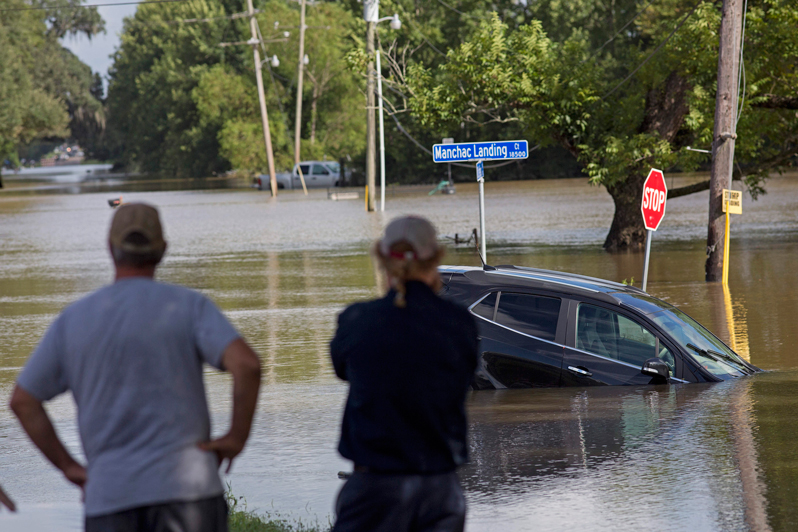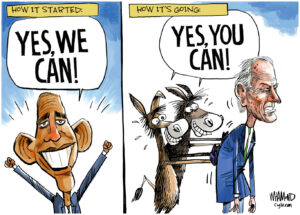Climate Change and the 1,000-Year Flood in Baton Rouge: When Will We Learn?
While any one extreme weather event can't be directly attributed to climate change, storms, droughts, wildfires, floods and hurricanes all are expected to become more frequent and more severe as the planet warms. Residents survey floodwater south of Baton Rouge, La. (Max Becherer / AP)
Residents survey floodwater south of Baton Rouge, La. (Max Becherer / AP)
By Amy Goodman and Denis Moynihan
Residents survey floodwater south of Baton Rouge, La. (Max Becherer / AP)
The floodwaters are receding in Baton Rouge, Louisiana, and the scale of the damage is revealing itself. It has been described as a 1,000-year flood, leaving at least 13 people dead and close to 60,000 homes ruined. According to Weather Underground meteorologists Jeff Masters and Bob Henson, August has been the wettest month in Baton Rouge in 174 years, when records were first kept. They added, “Since June 1, Baton Rouge has picked up an amazing 40.95 inches — more rain in three months than downtown Los Angeles has recorded over the last five years (38.79 inches)!”
President Barack Obama traveled there Tuesday. “I think anybody who can see just the streets, much less the inside of the homes here, people’s lives have been upended by this flood,” he said after walking through part of the devastated city. While Obama was criticized by his political opponents for not visiting Baton Rouge earlier, it’s what happened one day later, in nearby New Orleans, that should have everyone concerned.
The Obama administration conducted a massive auction of offshore oil and gas drilling leases in the Gulf of Mexico. The irony was not lost on Antonia Juhasz. She is a journalist and energy analyst who has long tracked the multinational petroleum corporations engaged in deep-water oil extraction. “Following Obama #LouisianaFlood visit, Interior Dept to auction offshore drilling leases to 24 million acres in Gulf on 8/24 at Superdome,” she tweeted, followed by, “After protests nearly shut down lease sale in March at Superdome, for first time, BOEM closes sale to public, makes viewing available online.” The BOEM is the federal Bureau of Ocean Energy Management. The agency was auctioning 23.8 million acres in the western section of the Gulf of Mexico, for deep-water oil and gas exploration and extraction.
We spoke to Juhasz on the “Democracy Now!” news hour, just before the auction began: “The timing of all of these events couldn’t be more devastating,” she said. “You have this historic flood. You have the president there to offer assistance from FEMA and to hopefully try and assist those on the ground, while at the same time the Interior Department is continuing the problems that help accelerate this storm in the first place, help make it more ferocious, help make these storms more frequent. And that, of course, is the burning of fossil fuels, leading to climate change.” Adding to the irony is the site of the auction: the Superdome. After Hurricane Katrina inundated most of New Orleans, this sports stadium became a refuge of last resort for an estimated 15,000-20,000 stranded residents.
While any one extreme weather event can’t be directly attributed to climate change, storms, droughts, wildfires, floods and hurricanes all are expected to become more frequent and more severe as the planet warms. Those thousands in the Superdome after Katrina should be considered climate refugees. For this building now to house the auctions for drilling for more fossil fuels only adds insult to the injury.
There is growing grass-roots activism directly confronting the extraction and transport of fossil fuels, from communities in the Gulf of Mexico to the Great Plains in the northern U.S. and Canada. On Tuesday, hundreds protested the planned auction. A huge banner floated beneath a balloon, reading “Another Gulf is Possible.” Four demonstrators were arrested after refusing to leave the Interior Department office in New Orleans. Last March, a similar auction of offshore Gulf drilling leases was almost canceled, as hundreds protested in the Superdome. That protest occurred just weeks after another massive flood hit southern Louisiana.
Meanwhile, in North Dakota, more than a thousand indigenous activists at the Sacred Stone Spirit Camp are blocking construction of the proposed $3.8 billion Dakota Access pipeline. They say the pipeline could contaminate the Missouri River, which provides water for the Standing Rock Sioux tribe and for millions more downstream. Also on Wednesday, an action was held outside the federal District Court in Washington, D.C., where the Standing Rock Sioux tribe has filed suit against the U.S. Army Corps of Engineers over the pipeline.
Rather than enabling more dangerous deep-water oil extraction off the shores of the Gulf Coast, President Obama should be spending his remaining months in office doing everything in his power to reduce our national dependence on fossil fuels.
Amy Goodman is the host of “Democracy Now!,” a daily international TV/radio news hour airing on more than 1,400 stations. She is the co-author, with Denis Moynihan and David Goodman, of the newly published New York Times best-seller “Democracy Now!: 20 Years Covering the Movements Changing America.” They are currently on a 100-city U.S. tour.
Your support matters…Independent journalism is under threat and overshadowed by heavily funded mainstream media.
You can help level the playing field. Become a member.
Your tax-deductible contribution keeps us digging beneath the headlines to give you thought-provoking, investigative reporting and analysis that unearths what's really happening- without compromise.
Give today to support our courageous, independent journalists.








You need to be a supporter to comment.
There are currently no responses to this article.
Be the first to respond.